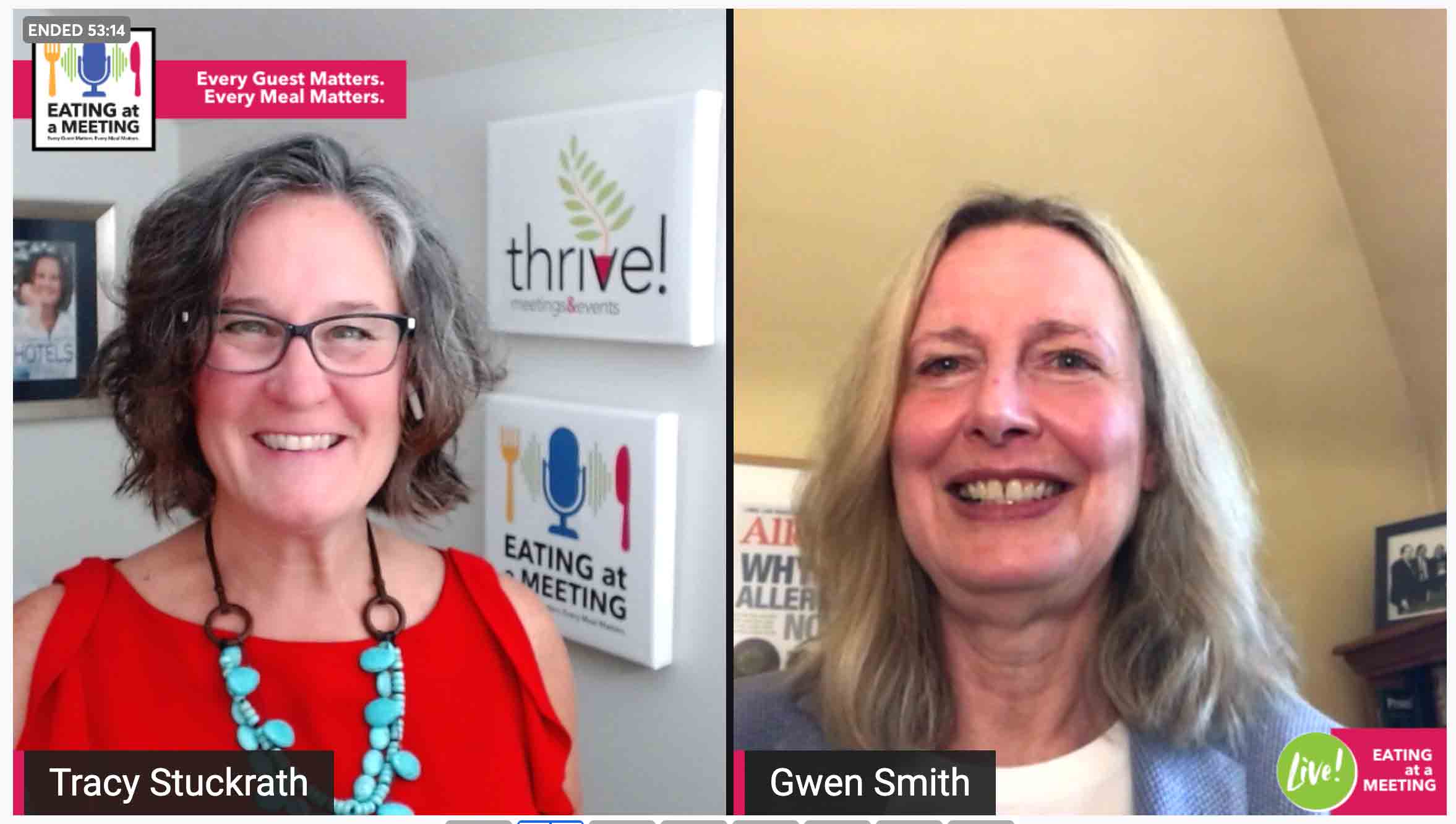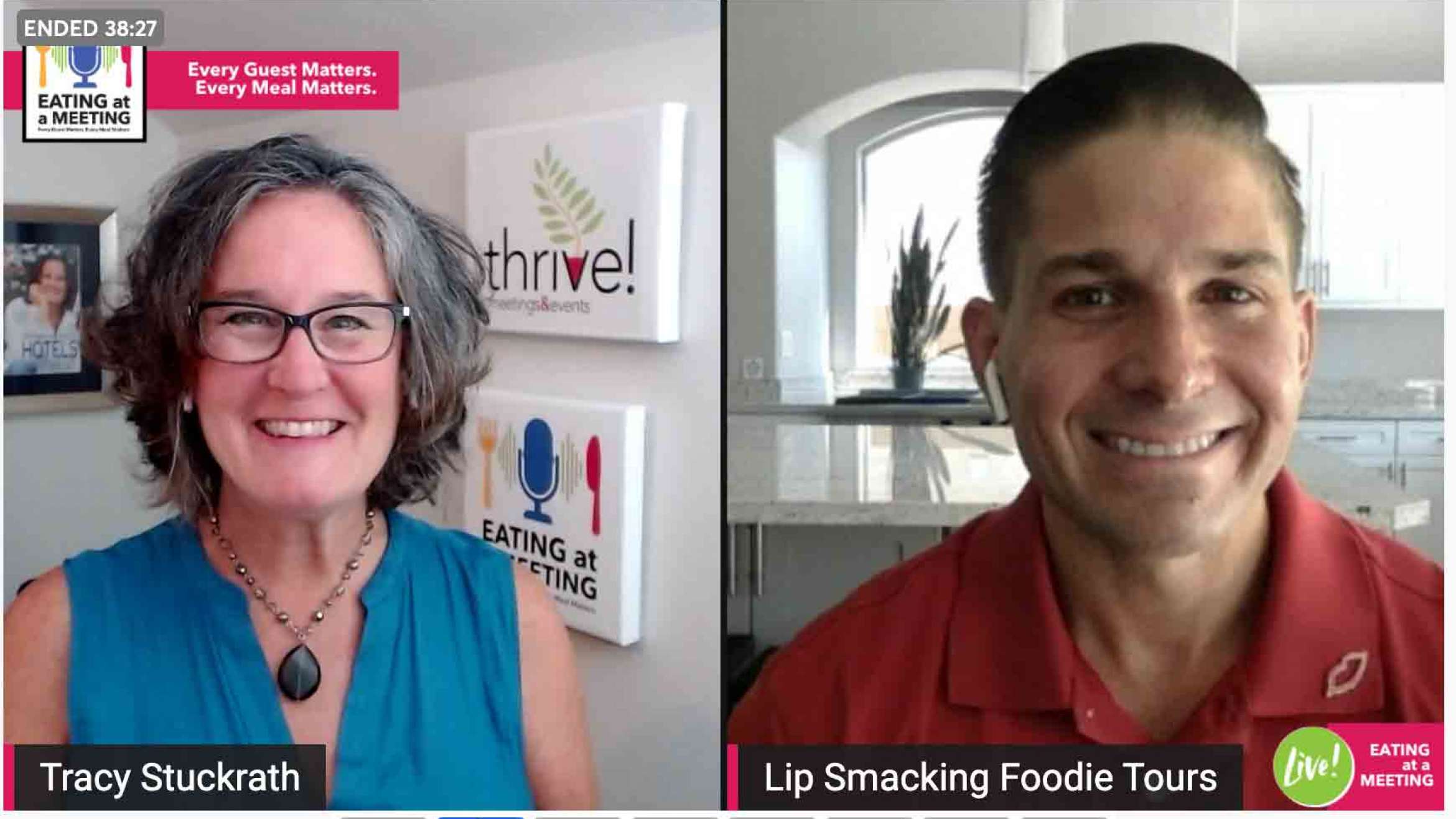Making the Invisible Visible
Eating at a Meeting Podcast Episode 141
Food allergies are an invisible disability that Gwen Smith wants to make visible.
If you were to look at a group of people would you be able to point out the ones who have food allergies or celiac disease? Probably not. They don’t look different from others standing next to them.
This is great on one hand, but also a serious challenge on the other. Food allergies and celiac disease are serious INVISIBLE medical conditions that millions of people live with every day, including Gwen Smith.
These medical conditions can be life-threatening, make it hard to be active, socialize, and live full and good lives, especially when there is food around. What you don’t see nor does the person standing next them is the extreme diligence that goes into staying healthy and safe every single day.
In this episode of Eating at a Meeting, Tracy chats with Gwen, editor and content chief of Allergicliving.com, who is an experienced journalist with severe food allergies, about why is it so important to you to make food allergies and celiac disease more visible.
Guest Introduction
Gwen Smith, Editor and Content Chief of Allergicliving.com, the largest consumer food allergy news website. Gwen is an experienced journalist, who also has severe food allergies..
What do safe, inclusive & sustainable food and beverage experiences look like to you?
To me, safe and inclusive reference a food-service establishment being able accommodate serious food allergies and celiac disease. Includes a manager/some staff with allergy training & understanding of cross-contact. Being able to dine out safely is so important to a good & full life. Inclusion matters. For Allergic Living, we’ve interviewed many food services pros. The good ones get it, but we still see much room for improvement. Check out this article.
Re sustainable: Obviously, so important and the UN goals illustrate the urgent need for change. I am encouraged by the number of restaurants that now serve local produce on the menu. I eat regularly at one that supports local farmers and spells out their more sustainable farming practices. Simple, delicious meals are also more easily made allergy-friendly..
Do you have an example of a situation that negatively effected you and/or other individuals or groups’ food and beverage experience?
Yes, I’ve been at large allergist conferences where I couldn’t eat and had to depend on packaged chips and fruit until I had time to get away from the conference meetings. I’ve been at event dinners where my ‘special meal’ got given to someone else. I’ve had restaurant servers tell me: “here’s the gluten-free menu” when I have 3 allergies but no gluten issue. It’s worrying, and you end up eating little.
What is a best practice you use/or have seen to create safe, sustainable, and inclusive F&B experiences?
Sustainable: Hotels using innovations like roof gardens, chicken coops and apiaries. Now that’s shopping local! Restaurants that go the distance to provide great allergy-safe meals. One chef told me: “I am in the hospitality industry. It is a point of pride that I can feed all my guests well.
What do you wish people knew about what you do?
That I put a lot of thought and effort into what Allergic Living covers. We’re not just re-writing PR releases; we speak to people firsthand, we do our own reporting. As well, we consciously aim to raise the profile of food allergies as a serious medical condition. We report news affecting the community. But a large part of my decision-making on what to cover includes thought on: will this help improve how we are as a recognized disease. Our information opens a lot of eyes to the realities of living with food allergies. Sometimes that’s even within the community, among those who hadn’t been carrying epinephrine, for example. Or it reminds parents to check in with teens and their food allergy management.
On the UN Sustainable Development Goals, it’s hard not to speak of poverty, clean water, education. But from the reporting with experts we do at Allergic Living, I mostly have things to say on: food insecurity and allergies, and the impact of climate-change on asthma and allergies: from ragweed pollen season to wildfires and extreme precipitation. All has an impact on growing seasons.
What is your favorite food and your favorite drink?
Narrowing down is tough! Fresh Mediterranean cuisine with olives, artichokes, tomatoes. Great Mexican food. Strawberry over chocolate. Don’t get me started..
Links
Connect with Gwen — Website | Facebook | Instagram | Twitter
Check out other featured guests on the Eating at a Meeting podcast.
Eating at a Meeting is part of the Nitty Grits Podcasts network




